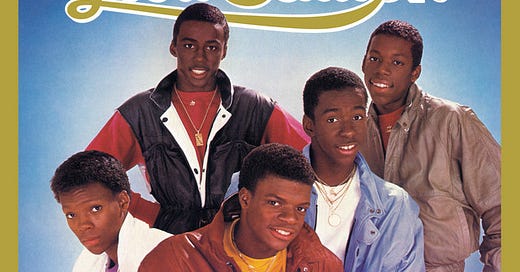Genre of the Day - Boy Band
Album of the Day - New Edition by New Edition (1984)
The other day, my songwriting professor stressed the importance of syllabic stress in the act of bringing your song to life vocally: he called attention to Fleetwood Mac’s “Dreams,” apparently objecting to the fact that Stevie Nicks sing sit as “washes” rather than “washes.” I personally do not approve of disrespecting Stevie Nicks’ artistic choices, but alas, it’s just one of our differences in opinion. I bring it up because in the boy band genre, the emphasis is very clearly on the boy—by now, the public is fully aware that these are not bands as we traditionally know them. It’s about the boys’ personality, style, pizzazz, and evidently, your ability to appease a record label.
Boy bands represent the zenith of highly organized talent, though their success relies equally on chance—would One Direction have reached its same heights if Nicole Sherzinger hadn’t miraculously arranged photos of its five boys into conjunction? Boy bands as marketing material serve perfectly—their lore drives mystery and narratives in fandom and tabloid fodder, and developing their performance talent captures one of the key record-buying audiences: young teens. Record labels became aware of this in the ‘60s: the Jackson Five under Motown rose to fame for their precocious sweetness and vivacious spirit. Record execs keenly remembered the frenzy of Beatlemania, and a business outlet was suddenly open: intentionally constructed groups of boys singing together, each individually meriting attention but greater in the sum of their parts.
The concept of a boy band is predicated on their boyish nature as teenage singers rather than their instrumental capacity as a band; boy bands rarely ever play instruments or conduct a large part in constructing their music other than dramatically busting out a note. Though typically subconsciously, we interpret our favorite artists as speaking to us: for millions of young girls over the decades, the allure of four, five, or six boys vocalizing your desires and hopes as a listener is a powerful commercial and parasocial draw. To enhance that draw, the commercial expectations for boy bands has been high since their inception. Capable dancing skills, sweet singing, and a face not for the radio have always been the core components of being a boy band. Social media has aided boy bands from becoming tweens’ seasonal objects of fascination to lore-loaded lodestones, each moment shared between the bandmates carefully logged and obsessed over by fans.
Musically speaking, in their development since the 1960s, boy bands have generally balanced pop and R&B sensibilities in a maximalist catchy mode while incorporating dynamic dance breaks to showcase a core visual aspect of their artistry. The stylistic origins are also clearly traceable to doo-wop, the original boy bands, who serenaded fans in close harmony with group-forward visual presentations. Evolving through the eras, the concept of a boy band got picked up most notably by international record companies in Korea, where boy bands like BTS, NCT, and Monsta X have revolutionized the standards of boy band sharpness and the intensity of fandom culture domestically and abroad.
New Edition was at the forefront of the second wave of boy bands, when a name was being applied to the phenomenon in the 1980s. The band’s impact was outsized; it gave birth to Bell Biv DeVoe, one of the pioneers in increasing rap’s commercial potential on the pop charts, and of course it brought Bobby Brown to fame—a career I feel little glory reminiscing on. But for a halcyon time of 1980s R&B, their youthful charm shone in efforts like 1984’s eponymous sophomore set. “Cool It Now” walks us through a post-school day conversation. Lead singer Ralph Tresvant was older than Bobby Brown, but you’d think he was twelve years old—he sells the storyline with pure earnestness of voice and tone. The Casio lushness and harmonies underscoring the genuine, device-assisted heartbreak of “Mr. Telephone Man” acts as the album’s best moment, youthful sorrow dissipating in its lite-funk groove. An urgent bass pumps through “Baby Love” as the near-literal baby declares his love, his bandmates’ precocious harmonies indulging alongside his reminiscing. “Lost in Love” is a truly touching starry-eyed, first-love ode, recklessly jumping decades ahead to old age with a key change befitting those dramatics. It’s a tender album, even vaguely gesturing at what you’d have to do to get in with a New Edition member in “Kinda Girls We Like,” that sincerely tackles the boys’ juvenile hopes, fears, and sillinesses without cheapening them for the sake of pushing records, an ideal balance in a genre defined by its commercial salience.







